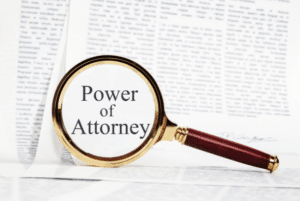People granted power of attorney may be tempted to exploit a deceased person’s estate and act in their own interest. That’s called abuse of power of attorney or breach of power of attorney.
If you feel that this might be happening in your family, you must act quickly to protect your loved one’s estate from further harm.
Taking legal action can be a chaotic process, so we recommend seeking assistance from a reputable lawyer to understand your options.
In the meantime, here’s what you can do when you suspect that the deceased loved one’s agent is taking advantage of their estate.
What Is A Power of Attorney in Georgia?
A power of attorney (POA) is a legal document that grants someone (known as an agent or attorney-in-fact) legal authority to manage another person’s financial and legal matters while that person still lives.
The person who grants that power is called the principal.
The trusted person who receives the authority is called an agent. An agent can be any competent individual whom the principal chooses to act on their behalf, such as a family member or a friend.
In some cases, the principal may hire an attorney to act as their agent in specific legal matters, but this is not a requirement for a power of attorney agreement.
The Duties of a POA Agent
The person granted power of attorney is responsible for acting in the best interests of the person they represent. Understanding the agent’s responsibilities helps you recognize whether they acted within their bounds.
Those responsibilities include:
- Making financial decisions on the loved one’s behalf.
- Managing the principal’s finances.
- Handling any legal matters or medical decisions.
The agent should act with care, loyalty, and honesty and avoid conflicts of interest or self-dealing. They must also keep accurate records of their actions and be prepared to provide those records upon request.
How Long Does a Power of Attorney Last?
Under Georgia law, the financial power of attorney immediately ends when the principal passes away.
After the principal dies, the agent loses the ability to move money around and make decisions for the deceased. The will of the deceased or Georgia law for intestacy would then take over.
Another way a power of attorney can end is when the principal revokes it.
Often, when discussing topics about power of attorney, a usual question comes up:
Is it possible to skip probate if the loved one left a power of attorney?
The answer is no. Having a power of attorney does not exempt anybody from the probate process.
If you use a power of attorney instead of following proper probate procedures, you may be held liable for estate decisions.
The Difference Between an Agent and a Personal Representative
Both an agent and a personal representative are responsible for managing legal and financial matters, but they differ in some ways.
An agent’s authority ends when the person who granted them power of attorney dies. On the other hand, a personal representative takes over after the person’s passing.
Additionally, an executor or administrator is appointed through a will or Probate Court, while a power of attorney is granted by the person who selected their own agent.
Signs of Power of Attorney Abuse
Several signs may indicate that an agent abused their authority. The common ones are:
- Sudden changes to the agent’s finances, such as large withdrawals, financial abuse, or unexplained expenses, seem out of the ordinary.
- If the principal is alive, their living conditions may have deteriorated, or they are not receiving the appropriate medical care or attention.
- If the loved one is deceased, there could be missing assets or property from their estate.
- The agent avoids communication with you and your loved one’s family members.
What Is the Penalty for Abuse of Power of Attorney in Georgia?
If someone has been found to have breached their POA in Georgia, they may have to pay the estate back what was taken and possibly have to pay other damages depending on the circumstances and the court’s decision.
Examples of Power of Attorney Abuse
POA abuse can manifest in multiple ways.
- Financial Abuse
This is one of the most common types of power of attorney abuse. It happens when the agent uses their authority to control the principal’s financial affairs for personal gain. There are legal consequences for fraud, exploitation, embezzlement, or theft in criminal court, prosecuted by either the state or federal government. - Neglect or Abandonment
Neglect or abandonment occurs when an agent fails to provide the necessary care for the person they represent. This can include not providing food, shelter, or medical treatment or abandoning the individual altogether. - Physical Abuse
Physical abuse involves using force or violence against the principal, which may result in injury or harm. The agent who committed this abuse may face civil and criminal penalties. In civil court, the agent may be sued for damages resulting from the abuse, such as medical expenses or pain and suffering. While in criminal court, the agent may face charges for assault, battery, or other related crimes. - Emotional or Psychological Abuse
Emotional or psychological abuse involves using words, actions, or other forms of behavior that cause emotional or psychological harm to the principal. - Elder abuse
Mistreatment of an older person can take various forms, such as physical, emotional, sexual, or financial abuse, neglect, or abandonment.
How to Report Power of Attorney Abuse?
A common first step that is taken when you discover that the agent has breached a power of attorney is to consider objecting to that person becoming the estate’s personal representative.
If the agent has already been appointed as the personal representative, you can raise an objection in other ways.
For example, if that person has committed improper actions while representing the estate, you can bring it to court along with the potential breach of power of attorney.
These types of probate situations are incredibly complicated. We recommend seeking assistance from a probate attorney to help you navigate the legal process.
What happens after you file an objection?
When you object to the agent becoming a personal representative, it starts a legal procedure called the discovery process.
During this procedure, both sides must share all the important information, such as financial documents, emails, and other communications. These documents will help reveal whether the agent breached their fiduciary duty.
When you object to an appointment, you can stop further actions that can harm the estate. This avoids more problems or mistakes while the legal proceedings are ongoing.
For example, the court may order the agent to stop selling any estate assets or making new transactions until the dispute is resolved.
What Can You Do If the POA Has Taken Estate Property?
If you believe the deceased left a will, you can request the court to order the will holder to deliver it to the probate court. Once the will is delivered, you can examine it to see if it appears valid. This will help you decide whether to challenge it or to support it.
If you know that the deceased did not have a will, you can petition the court to establish an estate and nominate yourself as the administrator.
In emergencies where there are stolen assets or real estate is being foreclosed upon, immediate legal intervention may be necessary. In this case, it may be appropriate to ask the court for short-term emergency powers given under temporary letters of administration.
The Temporary Administrator’s Role
The temporary administrator has limited authority, but it is usually enough to stop a third party from causing any more damage to the estate. This power also allows you to gather details about estate assets and past financial transactions.
All this information is vital to uncovering any potential abuses that the agent might have done.
How to Prevent Power of Attorney Abuse from Happening in the First Place?
While you cannot undo a POA abuse, you can still protect yourself and other family members from similar situations by being very selective when choosing an agent.
Consider choosing someone you know and trust with a responsible financial management and decision-making history.
You also need to set clear expectations and boundaries from the outset so that you and your agent understand your respective roles and responsibilities.
Finally, regularly reviewing and updating your estate planning documents is a good idea to ensure they reflect your wishes and intentions as your circumstances change.
Your Next Step
Making things right for your deceased loved one by holding the agent accountable despite the overwhelm and stress is a brave act.
However, courage can wear out when you realize that the situation is more challenging than you anticipated. So we highly recommend seeking assistance from a professional. Our experienced lawyers are here to support and guide you through this difficult time. Do not hesitate to reach us at (770) 796-4271 if you suspect POA abuse.
More information
Disclaimer These websites have not been reviewed by Georgia Probate Law Group and are not endorsed or even recommended by Georgia Probate Law Group. These websites are additional resources that you can use to further your general education on this topic.
Disclaimer: The information above is provided for general information only and should not be considered legal advice. Our probate attorneys provide legal advice to our clients after talking about the specific circumstances of the client’s situation. Our law firm cannot give you legal advice unless we understand your situation by talking with you. Please contact our law office to receive specific information about your situation.





























